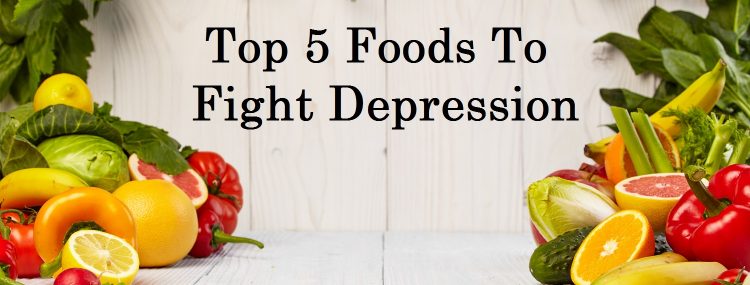
Top 5 foods to fight depression
Recent research has established that depression is an high risk factor for heart disease , along with high cholesterol and blood pressure….and equally dangerous !
Depression leads to increased levels of stress hormones, namely, cortisol and epinephrine. Excessive cortisol release in the body has been linked with increased body fat deposition, weight gain and high cholesterol levels. Apart from cortisol, there are other hormones that regulate mood and energy, and they include serotonin, oxytocin, endorphins and dopamine.
A very recent study found that depression leads to a weight gain of close to 4 kilos a year. The bottom line is, if you eat a burger when depressed out, you would end up with higher blood sugar and triglyceride levels than eating the same in a calm state of mind.
Depression can be a result of lack of sleep and vice versa. The modern day plague of working in night shifts adds to the problem and many women are now employed in late evening shifts.
Research done on people working in the shifts system has shown that major health effects, which may be manifested after a few years, could include:
- Sleep disorders and increased fatigue
- Gastro-intestinal problems including gastric ulcers
- Respiratory and cardio-vascular disorders
- Menstrual irregularities
- Hormone related problems like infertility
- Weight gain
- Social problems and minor psychiatric disorders
- Increased error and accident rates.
Foods high in sugars and fats may be seen as “comfort foods” but they actually deprive you of comfort by increasing harmful free radicals in the body that in turn, increase risk of inflammation and cortisol levels. Its best to avoid consuming sugary beverages, sweets, and junk foods even when depressed as these are counterproductive and can increase your depression levels.
What foods will be beneficial ? Although a balanced diet that provides a good balance of macro and micro nutrients is very essential for overall health, coupled with a regular exercise regime, the following key nutrients may provide optimum benefits to tackle depression.
Yeast – Found in fermented foods, yeast is a powerhouse of thiamine – a water soluble vitamin that regulates many neurological functions . Thiamine needs to be supplied through the daily diet since the body does not store the vitamin. A number of health problems including mild depression to chronic problems like dementia and possible Alzheimer’s, beriberi, Korsakoff’s psychosis and Wernicke’s disease are caused by severe thiamine deficiency.
Yeast is the best source of thiamine. Unpolished grains and millets are the next best while nuts, seeds, whole pulses are good sources.
Fruits and veggies: Go ahead and fill half of your plate with colourful fruits and vegetables. These nature’s bounties are filled with antioxidants. Oxidative stress is a term used to describe excessive free radicals that damage the DNA of cells, which lead to chronic diseases including cancer, Alzheimers, diabetes and heart disease. Antioxidants quench the free radicals by neutralizing them. The colors of fruits and vegetables especially the rich and dark colors of purple, deep red, yellow, orange and green have anthocyanins which are powerful antioxidants. Vitamin C, found in citrus fruits and amla, guava, capsicum, and beta carotene found in yellow orange fruits and vegetables are effective antioxidants that improve overall health and mental well being.
Seafood– Seafood, especially oyster, is rich in micro mineral called zinc. Studies have analyzed the relationship between blood levels of zinc and anxiety levels. They found that zinc supplementation helped improve symptoms of anxiety, depression and panic attacks. Low zinc levels also cause growth retardation in children, skin lesions and poor appetite.
While seafood, especially oysters, red meat are rich in zinc. , for vegetarians nuts and seeds , Beans, Chickpeas, Whole grain cereals are good sources of zinc.
Nuts and seeds – Nuts and seeds are the best sources of both minerals like zinc and other B complex vitamins. A handful of mixed nuts may provide the zinc you need in a day. B complex vitamins, especially thiamine play an important role in neurotransmission and mood regulation.
Green leafy vegetables – All green leaves are rich in magnesium -an important trace mineral in the human body that plays a role in brain biochemistry and the fluidity of neuronal membrane. Magnesium is also involved in production of an important antioxidant called glutathione. Deficiency in magnesium is known to cause – neuromuscular and psychiatric symptoms, including different types of depression.
Green leafy vegetables including spinach, mustard, pudina, and amaranth are great sources of magnesium. Whole grain cereals like brown rice, millets and pulses like black beans, rajma, horsegram are also rich sources. Seeds and nuts, banana and dark chocolate are other sources of magnesium.
An occasional low is a part and parcel of life’s ebb and flow, but chronic depression is now on the rise in India. Researchers believe one in five women, and one in ten men in India are depressed. Constant irritability, sudden aggression or suicidal ideation, rash driving and so on are some of those. Endorphins are the ones that are responsible for that “exercise high” – the general feel good factor that is the result of a good workout. For all levels of depression, exercise therefore should be an integral part of therapy and management.
Professionals design the best combination of meals and nutrients that provide all that you need in a day ! Order your healthy meal today at caloriecare.com !



